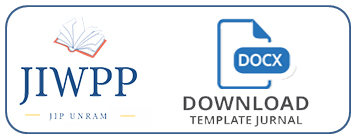PELATIHAN PENGGUNAAN INSTRUMEN IDENTIFIKASI KESULITAN FUNGSIONAL BELAJAR SISWA MENGGUNAKAN APLIKASI KOBOTOOLBOX BAGI GURU SDN 21 CAKRANEGARA
DOI:
https://doi.org/10.29303/interaktif.v3i2.97Keywords:
aplikasi kobotoolbox, guru sekolah dasar, kesulitan fungsional belajar, teknik identifikasiAbstract
The identification process is the earliest step in the service stages for children with learning functional difficulties. Knowledge and skills about the identification process must be owned by the teacher. A teacher must have the ability to identify children who are suspected of having learning difficulties. This ability is important for teachers to have in providing appropriate learning services to students who experience functional learning difficulties. The results of observations in several partner schools found a problem that the knowledge and skills of teachers in identifying children with learning difficulties were still lacking. Based on these problems, it is necessary to make efforts to increase the knowledge and skills of teachers in identifying children with functional learning difficulties. The solution offered to overcome this problem is to conduct Training on the Use of Functional Difficulty Identification Instruments for Student Learning Using the Kobo toolbox Application for elementary school teachers. Through this training, it is hoped that it will increase the knowledge and skills of teachers in identifying children with learning difficulties.
References
Andrews, J. J. W., Shaw, S. R., Domene, J. F., & McMorris, C. (2022). Mental Health Assessment, Prevention, and Intervention: Promoting Child and Youth Well-Being. Cham: Springer International Publishing AG.
Church, A. H., & Seaton, G. A. (2022). Learning agility as a key driver of leadership potential for talent identification, pipeline development, and succession planning in organizations. Consulting Psychology Journal, 74(3), 237–252. https://doi.org/10.1037/cpb0000238
Gonzalez, O. (2021). Psychometric and machine learning approaches for diagnostic assessment and tests of individual classification. Psychological Methods, 26(2), 236–254. https://doi.org/10.1037/met0000317
Grégoire, J. (1997). Diagnostic Assessment of Learning Disabilities: From Assessment of Performance To Assessment of Competence. European Journal of Psychological Assessment, 13(1), 10–20. https://doi.org/10.1027/1015-5759.13.1.10
Guillén-Gámez, F. D., Mayorga-Fernández, M. J., Bravo-Agapito, J., & Escribano-Ortiz, D. (2021). Analysis of Teachers’ Pedagogical Digital Competence: Identification of Factors Predicting Their Acquisition. Technology, Knowledge and Learning, 26(3), 481–498. https://doi.org/10.1007/s10758-019-09432-7
Hills, L. E., Falcomata, T. S., Nesselrode, R., & Erhard, P. (2022). Assessment and treatment of problem behavior with multiple functions for individuals with disabilities: A systematic review of the literature and discussion. Behavior Analysis: Research and Practice. https://doi.org/10.1037/bar0000259
Johnsen, S. K., & VanTassel-Baska, J. (2022). Handbook on Assessments for Gifted Learners : Identification, Learning Progress, and Evaluation. Milton: Taylor & Francis Group.
Kline, R. B., Lachar, D., & Boersma, D. C. (1993). Identification of special education needs with the Personality Inventory for Children (PIC): A hierarchical classification model. Psychological Assessment, 5(3), 307–316. https://doi.org/10.1037/1040-3590.5.3.307
Kline, R. B., Lachar, D., & Boersma, D. C. (1994). “Identification of special education needs with the Personality Inventory for Children (PIC): A hierarchical classification model”: Correction. Psychological Assessment, 6(4), 282–282. https://doi.org/10.1037/1040-3590.6.4.282
Kooij, J. J. S. (2021). Adult ADHD: Diagnostic Assessment and Treatment. Cham: Springer International Publishing AG.
Masrifah, M., Setiawan, A., Sinaga, P., & Setiawan, W. (2019). The content quality of teacher’s pedagogical and professional competence standards of senior high school physics teacher guide books. Journal of Physics: Conference Series, 1157, 032037. https://doi.org/10.1088/1742-6596/1157/3/032037
Place, N. (2022). The disability dilemma: How to use retirement tools for a special needs child. Financial Planning.
Saputra, H. H., Hakim, M., Affandi, L. H., Husniati, H., & Radiusman, R. (2021). SOSIALISASI PENGISIAN PROFIL BELAJAR SISWA INKLUSIF DI SDN 1 DAN MI AL-FATHIYAH LENDANG ARA KOPANG LOMBOK TENGAH. Jurnal Interaktif: Warta Pengabdian Pendidikan, 1(1), 7 - 13. https://doi.org/10.29303/interaktif.v1i1.2.
Schneider, L. H., Pawluk, E. J., Milosevic, I., Shnaider, P., Rowa, K., Antony, M. M., Musielak, N., & McCabe, R. E. (2022). The Diagnostic Assessment Research Tool in action: A preliminary evaluation of a semistructured diagnostic interview for DSM-5 disorders. Psychological Assessment, 34(1), 21–29. https://doi.org/10.1037/pas0001059
Sharma, K. (2022). Need of Psychological Assessment for Inclusive Classrooms. International Journal of Education and Management Studies, 12(3), 221–224.
Spain, D., Stewart, G. R., Mason, D., Milner, V., Fairhurst, B., Robinson, J., Gillan, N., Ensum, I., Stark, E., & Happe, F. (2022). Telehealth Autism Diagnostic Assessments With Children, Young People, and Adults: Qualitative Interview Study With England-Wide Multidisciplinary Health Professionals. JMIR Mental Health, 9(7), e37901. https://doi.org/10.2196/37901
Tichá, R., Abery, B., Johnstone, C., Poghosyan, A., & Hunt, P. (2018). Inclusive Education Strategies: A Textbook (Issue March). University of Minnesota. https://www.unicef.org/armenia/media/3501/file/Inclusive education strategies_Textbook_2018.pdf
Wang, Y., Fu, Y., & Luo, X. (2022). Identification of Pathogenetic Brain Regions via Neuroimaging Data for Diagnosis of Autism Spectrum Disorders. Frontiers in Neuroscience, 16. https://doi.org/10.3389/fnins.2022.900330
Wang, Y., & Xie, Q. (2022). Diagnostic assessment of novice EFL learners’ discourse competence in academic writing: a case study. Language Testing in Asia, 12(1), 47. https://doi.org/10.1186/s40468-022-00197-y
Wearmouth, J. (2022). Special Educational Needs and Disability: The Basics. Milton: Taylor & Francis Group.
Widodo, A., & Umar, U. (2020). Inclusive Primary Schools Without Shadow Teachers: Can Learning Services be Optimal? Jurnal Educative: Journal of Educational Studies, 5(2), 149. https://doi.org/10.30983/educative.v5i2.3196.
Widodo, A., Karma, I. N., Nisa, K., Amrullah, L. W. Z., & Syazali, M. (2023). PELATIHAN PENANGANAN SISWA BERKESULITAN BELAJAR DI SDN 4 BAJUR KOTA MATARAM. Jurnal Interaktif: Warta Pengabdian Pendidikan, 3(1), 62 - 67. https://doi.org/10.29303/interaktif.v3i1.87
Williams, L. M. (2022). The Specifics of Specific Learning Disability: An Analysis of State-Level Eligibility Criteria and Response to Intervention Practices. ProQuest Dissertations Publishing.















